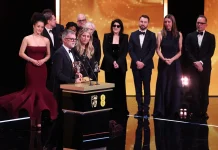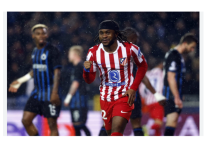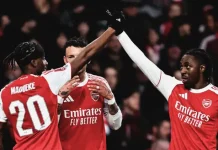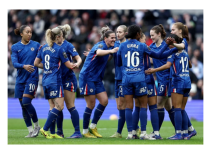In a dazzling display of football prowess, Barcelona triumphed over Real Madrid with a 5-2 victory in the Spanish Super Cup final on January 12, 2025.
This commanding performance not only secured Barcelona’s 15th Super Cup title but also added a remarkable chapter to the storied El Clásico rivalry.
Match Highlights
The final, hosted at King Abdullah Sports City in Jeddah, Saudi Arabia, commenced with Real Madrid seizing an early advantage:
5th Minute: Kylian Mbappé showcased his signature speed and precision, netting the opening goal for Real Madrid.
Barcelona’s response was swift and emphatic:
22nd Minute: Lamine Yamal, demonstrating remarkable composure for his age, equalized with a deft finish.
36th Minute: Robert Lewandowski converted a penalty, awarded after Eduardo Camavinga’s imprudent challenge on Gavi, propelling Barcelona into the lead.
39th Minute: Raphinha extended the advantage, skillfully heading in a precise cross from Jules Koundé.
First-Half Injury Time: Alejandro Balde capitalized on a counter-attack, slotting home to conclude a dominant first half for Barcelona.
Early in the second half, Raphinha struck again, making it 5-1. Despite goalkeeper Wojciech Szczęsny receiving a red card in the 56th minute for a foul on Mbappé, reducing Barcelona to ten men, they maintained control. Real Madrid’s Rodrygo managed to score in the 60th minute, but it wasn’t sufficient to alter the outcome.
Under the guidance of coach Hansi Flick, Barcelona employed a high-pressing strategy that effectively disrupted Real Madrid’s build-up play. The midfield trio of Pedri, Gavi, and Frenkie de Jong dominated possession, dictating the tempo and orchestrating numerous attacking opportunities. The width provided by Raphinha and Balde stretched Real Madrid’s defense, creating spaces for incisive attacks.
Several players delivered standout performances:
Lamine Yamal: The 17-year-old forward’s equalizing goal was a testament to his maturity and skill, shifting the momentum in Barcelona’s favor.
Robert Lewandowski: His experience was evident in winning and converting the penalty, demonstrating composure under pressure.
Raphinha: Contributing two goals, his pace and positioning were constant threats to Real Madrid’s defense.
Alejandro Balde: His overlapping runs and goal highlighted his offensive capabilities from the left-back position.
Resilience After Red Card
Playing with ten men following Szczęsny’s dismissal, Barcelona showcased remarkable resilience. Substitute goalkeeper Iñaki Peña made crucial saves, and the defensive unit remained organized, effectively neutralizing Real Madrid’s attempts to capitalize on their numerical advantage.
Real Madrid’s Challenges
Despite the early lead, Real Madrid faced significant challenges:
Defensive Vulnerabilities: Conceding four goals in the first half exposed significant defensive frailties.
Midfield Struggles: The trio of Luka Modrić, Toni Kroos, and Eduardo Camavinga struggled against Barcelona’s pressing, leading to turnovers.
Lack of Cohesion: The team’s pressing lacked coordination, allowing Barcelona to exploit spaces effectively.
This victory marked the first time Barcelona scored four or more goals in consecutive El Clásico matches, breaking a 62-year record. It also provided Hansi Flick with his first trophy as Barcelona’s coach, signaling a promising start to his tenure.
Barcelona’s 5-2 win over Real Madrid was a testament to their tactical acumen, individual brilliance, and collective resilience. Overcoming an early setback and a second-half red card, they dominated one of football’s fiercest rivalries, adding another illustrious chapter to their history.
































